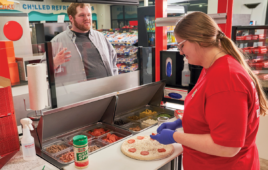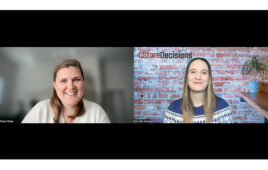Whether it’s tobacco, minimum wages or sugary drinks, states throughout New England are under attack from lawmakers looking to restrict sales or outright ban products crucial to convenience stores.
Jonathan Shaer is at the center of these battles. Shaer serves as the executive director of the New England Convenience Store and Energy Marketers Association (NECSEMA) in Brockton, Mass.
 Shaer has been around these issues for decades. Prior to taking the top spot at NECSEMA, he spent 15 years at Mutual Oil in various roles. He was responsible for all branded and unbranded dealer sales; customer, supplier and vendor relationships; general management; and all contract negotiations.
Shaer has been around these issues for decades. Prior to taking the top spot at NECSEMA, he spent 15 years at Mutual Oil in various roles. He was responsible for all branded and unbranded dealer sales; customer, supplier and vendor relationships; general management; and all contract negotiations.
Shaer sat down with me to discuss post-Covid retailing and the aggressive legislation retailers in New England are facing.

John Shaer, executive director, NECSEMA
JL: States throughout New England and the country have targeted core convenience store products, such as tobacco sugary beverages. How much of a threat is all this new legislation to our industry?
JS: The threats are significant, ever-present and need to be taken seriously. There is a lot of money flowing into organizations intent on eliminating or restricting some of our core products.
Massachusetts, in particular, is a proving ground for product bans and restrictions due to its progressive mindset so we’re often the first to see policies that eventually filter to the rest of the region and country. For example, one town in western Massachusetts is on the verge of legalizing LSD while a Boston suburb is banning tobacco sales to anyone born after 1/1/2000. Never a dull moment.
The categories that attract the most attention from advocates are among our most important – tobacco, beverages and even labor – so we must defend ourselves aggressively.
But convenience retailing is perhaps the most resilient retail channel, so I have no doubt we will continue to evolve and thrive. We’re like the cockroach of retail and I mean that in a good way.
JL: The Food and Drug Administration is proposing a ban on menthol cigarettes. This follows the 2020 Massachusetts ban on menthol cigarettes. What did you learn from that ban and what can the rest of the country expect if this ban is implemented nationwide?
JS: Bans don’t work. They particularly don’t work with traditional tobacco and ENDS which are already sold in a thriving illicit market. Bottom line, and I say this every time I testify, products with demand will always find a market. I think I learned that in my freshman year economics class so it is remarkable that legislators still don’t get it – or don’t want to accept it.
In the 11 months since Massachusetts banned flavored tobacco, New Hampshire and Rhode Island have made up 85% of the cigarette sales Massachusetts relinquished. These products have either returned for personal consumption or illegal sales. So the state has given up over $120 million in excise tax revenue and has the same consumption. So by all accounts, it has failed miserably.
A nationwide ban of menthol cigarettes and cigars would certainly eliminate excise tax disparities and related cross border sales. But I fear a black market would persist, just on a national level. The economics don’t change – demand finds a market.
JL: I saw data that reported New Hampshire’s cigarette sales increased 46% and it gained more than $28 million in tobacco excise taxes following the implementation of Massachusetts anti-tobacco legislation. How has this impacted sales of other categories at Massachusetts convenience stores?
JS: The cigarette excise tax stamp sales data we’re tracking shows New Hampshire is up 23% and Rhode Island is up 16% in the 11 months since the Massachusetts ban took effect in June 2020. The market basket, as you would expect, has been proportionately impacted. A sampling of retailers across the 3 states show in-store sales are up 94% in New Hampshire 15% in Rhode Island and down 10% in Massachusetts. It should be noted, this is a sampling and stores along the border (depending on which side you’re on) saw greater impact while stores further from the border saw less of an impact.
JL: In addition to targeting tobacco, what are the other two or three legislative issues retailers should know about and prepare for?
JS: Anyone selling gasoline needs to be aware of the Transportation Climate Initiative Program (TCI-P). It is a program modeled on the Regional Greenhouse Gas Initiative (RGGI) for electricity generation in the northeast, and the Western Climate Initiative in California for motor fuels. TCI-P requires distributors of gasoline and diesel to purchase allowance credits for the product they sell into a participating state. Each year, credit availability is reduced in an effort to make gas less available and more expensive with the intent to change behavior. The proceeds will be used by states to fund climate change programs.
We also expect online lottery to take a big leap forward in the next couple of years. Rhode Island and New Hampshire have already done it, but the Massachusetts and Connecticut lotteries are far larger and mean a great deal more to our stores. We believe it is a matter of when, not if, so we’ve pivoted to finding common ground with lotteries so we can benefit from an evolving lottery ecosystem rather than be left behind.
JL: How can retailers get more involved in the legislative process to fight back against some of these Draconian legislative proposals like what we are seeing in Maine?
JS: You really need to join your state association. And, if you’re already a member, you need to get involved and show up to testify on certain issues. I understand the apprehension of putting your corporate brand on certain issues, but sometimes you need to speak up and good association directors will craft talking points that allow you to testify credibly and professionally.
Retailers also need to develop relationships with their local and state elected officials. I know its cliché but all politics are truly local. There is no greater value and you’d be shocked at how effective it is to be on a first name basis with men and women making decisions that impact your business. If there was one recommendation I could make, it would be this. It’s cheap, it’s easy and they want to hear from you.



